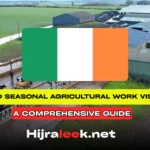The Portugal Seasonal Agricultural Visa 2026 offers non-EU/EEA nationals a pathway to engage in temporary work in Portugal’s vibrant agricultural sector, which is renowned for producing olives, wine, fruits, and vegetables. As a key component of the Schengen Area’s labor mobility framework, this visa addresses seasonal labor shortages in rural regions like Alentejo, Ribatejo, and the Douro Valley. Known as the E8 Temporary Stay Visa or Seasonal Work Visa, it allows workers to stay and work for 90 to 270 days in agriculture-related fields. This step-by-step guide, optimized for the keyword Portugal Seasonal Agricultural Visa, covers eligibility, required documents, the application process, costs, benefits, challenges, and more, helping you prepare for opportunities in 2026. Platforms like Hijraleek can connect you with verified Portuguese employers to secure job offers.
Introduction to the Portugal Seasonal Agricultural Visa 2026
Portugal’s agriculture sector contributes significantly to its economy, with exports exceeding €10 billion annually in products like cork, olive oil, and wine. The Portugal Seasonal Agricultural Visa 2026 facilitates the entry of international workers to support peak seasons, such as olive harvesting (October–December) and fruit picking (spring–summer). Under the EU’s Seasonal Workers Directive, this visa ensures fair working conditions, including minimum wages and health protections. For 2026, Portugal anticipates increased demand due to climate-driven harvest variations and EU sustainability goals, making it an ideal time for workers seeking short-term employment in Europe’s sunny south. Non-EU nationals must apply through Portuguese embassies or VFS Global centers, with processing times typically 15–60 days.
Why Portugal Needs Seasonal Agricultural Workers in 2026
Portugal faces persistent labor shortages in agriculture, with over 50,000 seasonal positions unfilled annually due to an aging rural workforce and urban migration. In 2026, factors like the EU Green Deal’s emphasis on sustainable farming and potential post-2025 economic recovery will heighten needs for workers in organic farming and vineyard maintenance. Regions like the Algarve and Azores rely on international labor for tasks such as pruning, harvesting, and packing, ensuring timely production for global markets. The visa program promotes ethical recruitment, preventing exploitation and supporting Portugal’s goal of 20% agricultural growth by 2030.
Who Can Apply for the Portugal Seasonal Agricultural Visa?
Eligibility for the Portugal Seasonal Agricultural Visa is straightforward, targeting non-EU/EEA/Swiss nationals:
- Nationality: Open to citizens of third countries (e.g., Brazil, India, Nepal, Ukraine) without EU residency.
- Age: Minimum 18 years; no upper limit, but physical fitness is essential for demanding roles.
- Job Offer: A valid contract from a Portuguese employer or temporary work agency in agriculture (e.g., fruit/vegetable harvesting, livestock care).
- Health and Character: Clean criminal record and good health; no serious illnesses that pose public risks.
- No Prior Qualifications: Entry-level roles require no formal education, though experience in farming is advantageous.
EU/EEA/Swiss citizens can work freely without a visa, registering locally if staying over 90 days.
Types of Portugal Seasonal Agricultural Visas in 2026
Portugal offers visas tailored to seasonal needs, with the E8 being the primary for agriculture.
Seasonal Work Visa (E8 Temporary Stay Visa)
- Purpose: For temporary employment in seasonal sectors like agriculture (harvesting olives, grapes, citrus fruits).
- Duration: 90–270 days, non-renewable beyond 9 months in a 12-month period.
- Key Features: Allows one entry; convertible to a residence permit if extended work is found. Employer must prove no EU workers available via labor market test.
- Sectors: Agriculture, forestry, fishing, hunting, livestock.
Short-Stay Schengen Visa (Type C) for Seasonal Work
- Purpose: For shorter agricultural gigs (up to 90 days in 180 days).
- Duration: Up to 90 days, suitable for brief harvests.
- Key Features: Issued as a Schengen visa; requires work authorization from Portuguese authorities (IEFP).
For longer or skilled roles (e.g., farm supervisors), the D1 Work Visa may apply, but the E8 is standard for seasonal agriculture.
Eligibility Requirements for Portugal Seasonal Agricultural Visa 2026
To qualify, applicants must fulfill these criteria, ensuring compliance with Portuguese labor laws.
Age and Health Conditions
- Age: At least 18; roles involve physical labor, so applicants should be capable of 8-hour shifts in varying weather.
- Health: Proof of good health via a medical certificate (no communicable diseases). Tuberculosis screening may be required for stays over 90 days, conducted by an approved clinic.
Education and Skills Needed
- Education: None required for unskilled roles (e.g., pickers, packers). Skilled positions (e.g., tractor operators) need basic vocational training.
- Skills: Prior farming experience preferred but not mandatory. Basic knowledge of tools or safety protocols is a plus; training is often provided on-site.
Language Requirements
- Language Skills: No formal proficiency test needed. Basic English or Portuguese (A1 CEFR) aids communication; many employers use multilingual supervisors.
Documents Required for Application
Gather these documents for a smooth submission. All non-Portuguese documents must be translated into Portuguese or English and apostilled.
Valid Passport and Photos
- Passport: Valid for 3+ months beyond stay, with 2 blank pages; include copies.
- Photos: Two recent biometric photos (3.5×4.5 cm, white background).
Job Offer from a Portuguese Employer
- Work Contract: Signed agreement detailing job (e.g., olive harvester), location, hours (up to 40/week), salary (min. €820/month), duration, and vacation. Employer must be registered with IEFP and provide labor market test proof.
- Employer Letter: Confirms no EU candidates available and outlines support (e.g., housing).
Medical Exam and Police Certificate
- Medical Exam: Certificate from an authorized doctor (€50–€100).
- Police Certificate: Criminal record extract from home country (apostilled, €20–€50), valid for 3 months.
Additional: Proof of accommodation (employer-provided or rental), travel insurance (€30,000 coverage), and flight itinerary.
Step-by-Step Application Process
The process for the Portugal Seasonal Agricultural Visa 2026 takes 15–60 days; start 2–3 months before your intended start date.
How to Find an Agricultural Job in Portugal 2026
- Search Platforms: Use Hijraleek, EURES, Indeed.pt, or Agroportal.pt for listings in Alentejo or Douro.
- Recruitment Agencies: Contact IEFP-approved agencies like Randstad or Adecco for sponsored positions.
- Apply: Submit CV highlighting any farming experience; interviews may be virtual.
- Secure Offer: Negotiate contract; employer handles IEFP approval.
Peak seasons: March–June (fruits), September–December (olives/grapes).
Online Visa Application Process
- Employer Submits Authorization: Employer applies to IEFP for work permit (5–10 days).
- Gather Documents: Compile passport, contract, medical/police certificates, insurance.
- Book Appointment: Schedule at Portuguese embassy/consulate or VFS Global via vistos.mne.gov.pt.
- Fill Form: Complete Schengen (Type C) or National (E8) visa form online.
- Submit In-Person: Attend appointment for biometrics (€80 fee); pay via card/cash.
- Track Status: Use VFS reference number or embassy portal.
Processing Time and Approval
- Time: 15 days (Schengen), 30–60 days (E8); faster for agriculture under EU quotas.
- Approval: Receive visa sticker; enter Portugal and apply for residence permit (AIMA) within 4 months if over 90 days.
Cost of Applying for Portugal Seasonal Agricultural Visa 2026
Government Fees
- Visa Fee: €80 (Schengen), €90 (E8); free for certain nationalities (e.g., CPLP countries).
- Residence Permit: €80–€170 if needed.
Other Expenses
- Medical/Police: €70–€150.
- Translation/Apostille: €50–€100.
- Travel: Flights €200–€800; employer may reimburse.
- Insurance: €50–€100 for 3–9 months.
Total: €300–€600, often offset by first paycheck.
Salary and Benefits for Agricultural Workers in Portugal 2026
Average Salary in Seasonal Agriculture
- Entry-Level: €820–€1,000/month (min. wage €820); €5–€7/hour for picking.
- Skilled: €1,000–€1,500/month for supervisors.
- Overtime: +25% on Sundays/holidays.
Housing, Food, and Transportation Support
- Housing: Employer-provided (free or €100–€200/month deduction).
- Food: Often included or subsidized (€5–€10/day).
- Transport: Shuttle to fields; some cover airport pickup.
Benefits: 14 paid holidays/year, social security, healthcare access.
Challenges and Tips for Success
Common Challenges
- Quotas: EU limits (e.g., 1,000–2,000 visas/year); apply early.
- Processing Delays: Peak season backlogs; submit in off-months.
- Language/Isolation: Rural areas; learn basic Portuguese.
- Physical Demands: Heat/harvest intensity; prepare fitness.
Tips for Fast Approval
- Secure Strong Offer: Use Hijraleek for verified employers.
- Complete Docs: Apostille early; use certified translators.
- Apply Off-Peak: January–February for summer jobs.
- Follow Up: Track via VFS; prepare for interview questions on motivation/skills.
Useful Resources and Official Links
Portuguese Ministry of Foreign Affairs – Visa Portal
- Vistos MNE: Official application forms, requirements, and appointments.
Job Platforms for Agricultural Work
- Hijraleek: Matches workers with Portuguese farms.
- EURES Portugal: EU job portal with seasonal listings.
- IEFP: Institute for Employment and Vocational Training for employer approvals.
Conclusion
The Portugal Seasonal Agricultural Visa 2026 is an accessible entry point for non-EU workers to experience Portugal’s lush farmlands while earning a fair wage. By securing a job offer, gathering documents, and applying through official channels like VFS Global, you can join harvests in idyllic settings. With EU-backed protections and growing demand, 2026 promises abundant opportunities—start by exploring Hijraleek and Vistos MNE today.
Why 2026 is the Best Year to Apply
Portugal’s alignment with EU sustainability targets and post-pandemic tourism boom will boost agricultural needs. Relaxed quotas under the Seasonal Workers Directive and the “Green Route” fast-track (20 days for priority sectors) make 2026 efficient. Enjoy mild winters for off-season prep and vibrant festivals like the Douro Wine Harvest.




















